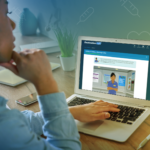How your nursing background helps with OET Listening
Mar 2023
Bringing your professional skills to the OET exam
As you know, your expertise in nursing is not just about factual medical knowledge. There are many professional skills you can use to pass the exam that you have been developing since you started your career!
What skills can you bring to the Listening Subtest, and how can you use the Destination OET platform to build on these skills?
To work in the NHS as a nurse, you need to have a C+ or above in the OET Writing Subtest, and a B or above in Reading, Listening, and Speaking.
The OET test scenarios are very realistic and are designed to be like real life, but you will lose points if you try to answer with information which is not mentioned in the test.
The skill is to
- understand
- prioritise
- organise
- communicate
the information you have been given.
When you have done this, there won’t be much time or space to bring in your own knowledge! It’s important to remember that despite your expertise, the OET is above all a language test and not a test of how much you know about healthcare.
Brushing up on the basics of healthcare
The listening test is about your comprehension. It is a test of the knowledge you have of medical vocabulary on a wide range of topics.
You may have specialised since your initial training – in paediatric nursing or coronary aftercare, for example. In the OET listening, you will have to remember your initial training and show understanding of a variety of topics to perform well.
On Destination OET, you will
- hear lifelike conversations between different specialists and their patients
- gain experience in recognising non-specialist terms for medical conditions and procedures
- learn synonyms to help you understand better.
You can also prepare for the test by revising the topics that you studied as part of your nursing training. In this way, you can be sure you can understand the terms used when professionals in these fields talk to patients and colleagues.
Using your experience to predict the content of audio recordings
Your real-life experience of the healthcare environment can help you to predict the content of the recordings in the listening subtests. This will help you be more confident, and your understanding will be better as a result.
When reading the questions on the listening section, try to imagine the type of conversations, exchanges or presentations that may take place.
Our students have told us that they loved hearing a variety of accents in our activities, which prepared them for the listening exam, and for the workplace beyond.
An example:
In the Listening Sub-test, if the context sentence is ‘A nutritionist talks about a patient’ you can consider questions such as
- ‘why would a patient be seeing a nutritionist?’, or
- ‘what concerns would a nutritionist have for a patient?’
Destination OET provides expert, focussed practice to help you through the exam and into the workplace beyond.





